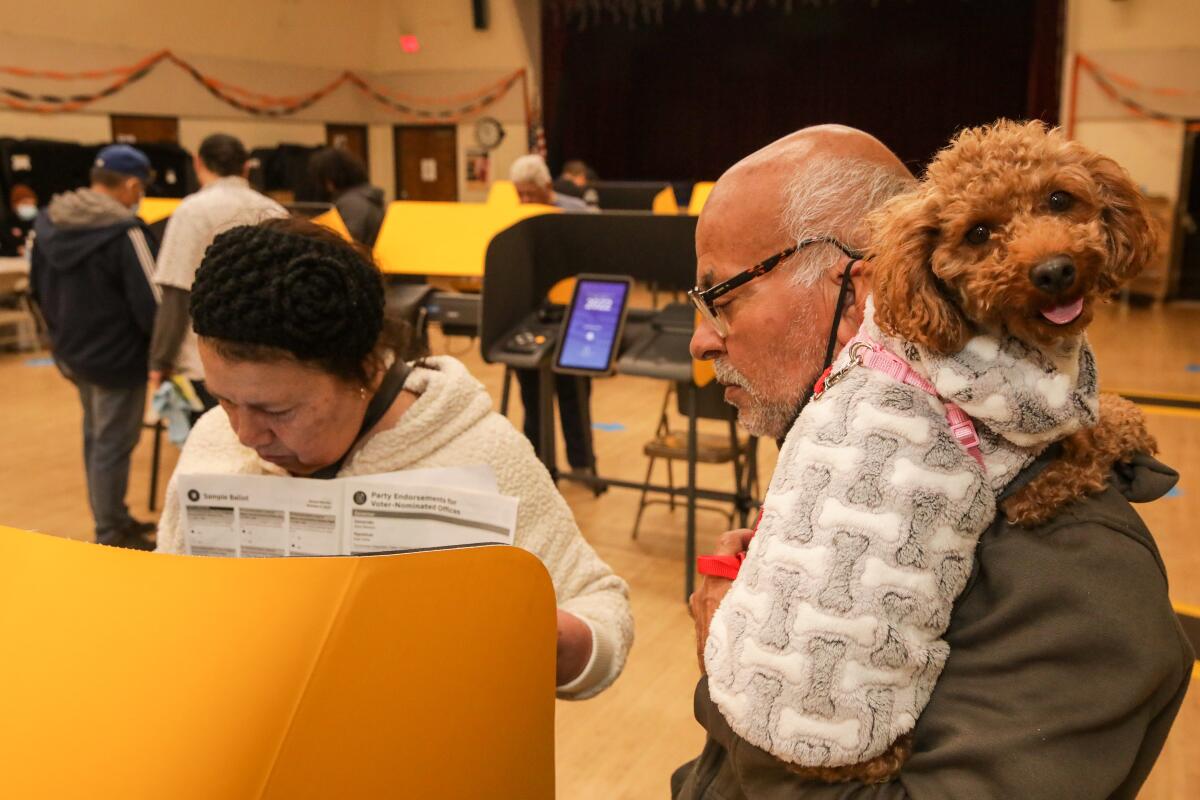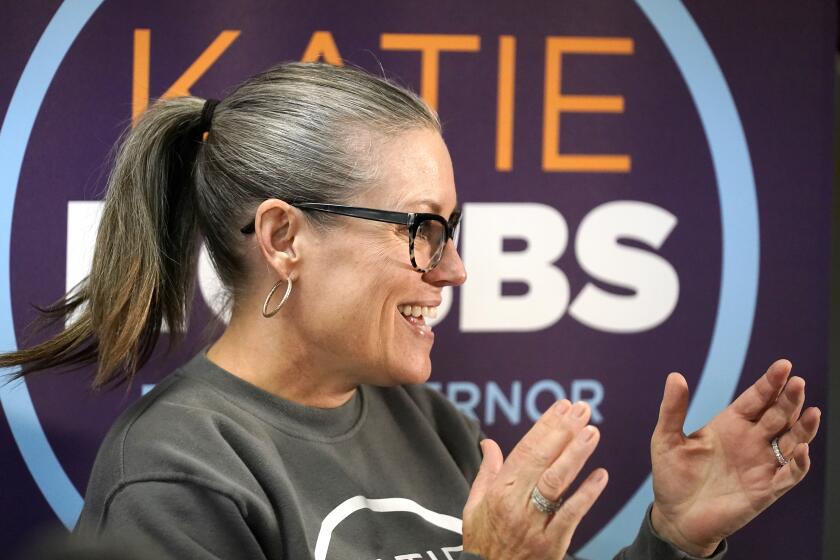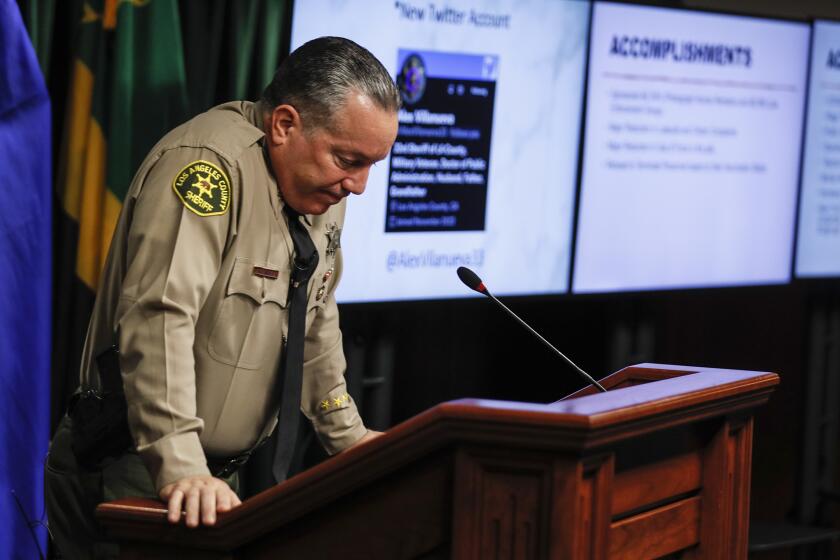Liars lose and deniers are denied. In the midterms, democracy comes out ahead

- Share via
Today we discuss liars, deniers and standing at the precipice.
Wow, what an election!
Indeed. Something in the midterm results to please everyone. Republicans took control of the House. Democrats kept hold of the Senate.
Any moment now I expect the clouds to part and a chorus of heavenly angels to break out in song.
Seriously.
OK, forget the celestial choir. But there was some seriously good news emerging from this acrid election cycle: All the bad things that didn’t happen.
Such as?
There were no major glitches in the casting or counting of tens of millions of ballots.
There was no political violence. Sad having to take that into account, but that’s where we are these days.
Perhaps most importantly, voters rejected several high-profile candidates who parroted the “Big Lie” about a stolen 2020 election or who set out to hijack the balloting machinery so they could manipulate the result of future elections.
Or both.
Thankfully, with one notable exception, most of those defeated candidates accepted their loss rather than emulate the Republican whiner-in-chief, former President Trump. The outlier is Arizona gubernatorial loser Kari Lake, who’s apparently auditioning for the role of Trump’s 2024 running mate by threatening a groundless lawsuit and proving she can just as blithely ignore facts and act irresponsibly.
“Relative to expectations, that kind of behavior was less common than we feared,” said Brendan Nyhan, a Dartmouth College government professor and co-founder of Bright Line Watch, a group that monitors the state of American democracy. “It’s an important step forward.”
Amid signs Trump is losing his grip on the Republican Party, a familiar appeal to grievance. Will his GOP rivals be as deferential as they were before?
Go on.
Let’s begin with the outcome in several battleground states. Those are the ones that will probably be key in deciding the 2024 presidential campaign.
In Michigan, Pennsylvania and Wisconsin, as well as Arizona, voters rejected election-denying candidates for governor. That’s important because it’s up to the governor to certify the election results in his or her state. Refusing to accept the outcome of the 2020 presidential race in the face of incontrovertible evidence showed a willingness on the part of those conniving GOP candidates to subvert future elections they don’t like.
Really?
Don’t take my word for it. Running for governor of Wisconsin, Tim Michels vowed if he won Republicans would “never lose another election” in that perennially hard-fought state.
That’s not kosher.
No, it’s not.
You also saw Big Lie proponents lose Senate races in Arizona, Nevada and New Hampshire. That matters because it’s up to Congress to certify the result of the presidential election, which is what the Jan. 6 insurrectionists, egged on by Trump, were attempting to prevent.
Whew.
Significantly, voters rejected a number of Republicans running for secretary of state, the position that supervises elections in most of the country. A victory would have allowed saboteurs not only to try to change the rules and make it harder to vote — by, say, eliminating mail ballots or erecting barriers to participation — but also to potentially manipulate the results to benefit their preferred candidates.
Fortunately, election deniers lost secretary of state races in the swing states of Arizona, Nevada and Michigan as well as Democratic-leaning Connecticut, Massachusetts, Minnesota, New Mexico and Vermont.
So the talk of “democracy on the brink” was overblown?
I wouldn’t say so. The threat was real. And it was vital for voters to understand the stakes of the midterm election.
Obviously, many did. More than 4 in 10 of those interviewed in a survey for the Associated Press said they considered the future of democracy to be a pressing concern, just behind inflation. That helps explain why Democrats did better than expected and so many election-denying, Trump-embracing Republicans were defeated.
Look at it this way: If there was a gas leak inside a house and you warned someone against lighting a match inside, would you say the warning was “overblown” because an explosion didn’t take place?
I suppose not.
And to be clear, the results weren’t all positive.
Election deniers won races for secretary of state in Alabama, Indiana, South Dakota and Wyoming. While none of those solidly Republican states are likely to determine the outcome of the 2024 presidential race, that’s still bad news that raises doubts about the conduct and integrity of elections in those states.
:-(
Also, two election-denying Senate candidates were elected, Ted Budd in North Carolina and J.D. Vance in Ohio. In Wisconsin, Sen. Ron Johnson was narrowly reelected even after he schemed to present a fake, pro-Trump set of 2020 electors to Vice President Mike Pence, whose duty it was to certify Joe Biden’s victory.
Furthermore, dozens of election-denying House candidates will soon join the scores of Republicans who voted against certifying President Biden’s 2020 victory. And a number of local office seekers were chosen for positions overseeing elections at the city and county levels.
That’s worrisome.
It is. Especially with Trump running a third time and continuing to press his lies about voter fraud and his failed reelection bid.
But on the brighter side, the candidates who could have done the most damage — in positions like governor and secretary of state — were defeated in the battleground states that matter most.
“It would have been really worrisome to imagine, especially now that Trump is a candidate, someone who either is willing to lie about what happened in 2020, or who’s gullible enough to believe the election was stolen, either running the election or certifying the election results,” said Rick Hasen, a UCLA law professor who directs the Safeguarding Democracy Project.
But, as Hasen noted, it would be wrong to act as though the threat to democracy has suddenly gone away.
“We stepped a foot back from the ledge,” he said. “But we’re still on the ledge.”
Um, Happy Thanksgiving?
Yes! Happy Thanksgiving. Let the angels sing!
But stay vigilant.
More to Read
Get the latest from Mark Z. Barabak
Focusing on politics out West, from the Golden Gate to the U.S. Capitol.
You may occasionally receive promotional content from the Los Angeles Times.












